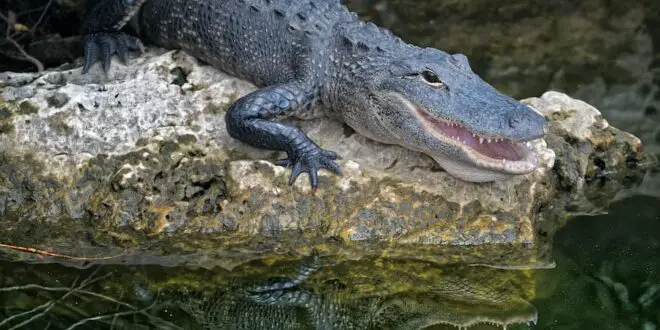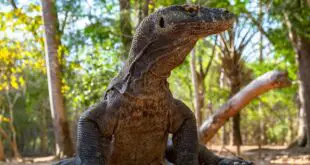Are alligators scared of humans? Alligators are often regarded as one of the most feared creatures in the animal kingdom. Their powerful jaws and sharp teeth have earned them a reputation as a formidable predator.
However, a curious phenomenon occurs when alligators encounter humans – they tend to escape, which raises the question: are alligators afraid of humans?
This article will explore this topic in-depth and explain the relationship between alligators and humans. We will also address whether or not alligators pose a danger to humans.
But before we get into details, let’s start by answering the question you come here looking for answers.
Are Alligators Scared Of Humans?
Alligators naturally fear humans; they will typically retreat when approached by people.
While it is extremely rare for wild alligators to chase humans, they can run up to 35 miles per hour for short distances on land.
However, this behavior is not typical. For example, a female alligator may charge a person who gets too close to her nest to protect her eggs.
When Will An Alligator Attack You?
With their powerful jaws and impressive size, alligators can be quite intimidating. While they prefer to avoid humans, certain circumstances may lead to an alligator attack. These include:
1. If provoked
Alligators have an instinct to defend themselves when they feel threatened. If someone intentionally or unintentionally provokes an alligator, such as getting too close or disturbing it somehow, the alligator may respond aggressively.
It is important to keep a safe distance from alligators and avoid any actions that may provoke them.
2. Protecting hatchlings/ eggs
Just like any other parent, alligators are fiercely protective of their young. A female alligator fiercely protects her hatchlings and eggs during the nesting season. They may act aggressively to ensure their safety if they perceive a threat to their offspring.
3. When surprised
These creatures are known for their stealth and ability to blend into their surroundings, making it easy for them to catch prey off guard.
If an alligator feels startled or threatened by sudden movements or loud noises, it may react by attacking as a defensive mechanism.
4. When cornered/threatened
When cornered or threatened, an alligator may also resort to aggression. If an alligator feels trapped or unable to escape, it may lash out to defend itself.
This is why giving alligators plenty of space is important and avoiding putting them in situations where they feel threatened or trapped.
5. Food scarcity
When an alligator is hungry and perceives weakness in its potential prey, it may be more likely to attack in times of food scarcity. Alligators are opportunistic feeders and will take advantage of any available food source.
If they encounter a vulnerable target, such as a small animal or a child, they may see it as an opportunity to secure a meal.
6. Protecting their territory
Territoriality is a fundamental aspect of alligator behavior. They establish and defend their territories, often marked by bellowing vocalizations and other displays of dominance.
Intruding into an alligator’s territory can be challenging, and the reptile may respond aggressively to maintain its dominance.
How To Avoid Getting Attacked Or Killed By An Alligator
Alligators inhabit various water bodies, including lakes, rivers, and swamps. While rare, alligator attacks can occur, and it is important to take precautions to avoid such encounters.
Following a few simple guidelines can significantly reduce the risk of being attacked or killed by an alligator.
Avoid swimming in alligator-infested waters.
Prevention is key! One of the best ways to avoid alligator attacks is to stay out of waters infested with alligators.
Familiarize yourself with the areas where alligator sightings have been reported, and heed any warnings or signs posted by local authorities.
You don’t have to take a selfie!
With today’s social media pressure, capturing every moment, including encounters with wildlife, is tempting. However, you need to exercise caution when it comes to alligators.
Getting too close for a selfie can put you at significant risk. Remember, alligators are wild animals, and you should observe them from a safe distance.
Supervise kids and pets around water.
Children and pets are naturally curious and may unknowingly venture too close to the water’s edge, putting them in harm’s way.
Ensure that kids and pets are closely supervised and kept away from the water whenever you’re in alligator territory.
Teach them about the potential dangers of alligators so they understand the importance of staying at a safe distance.
Don’t feed alligators.
Feeding alligators is not only illegal in many areas but also highly dangerous. When humans feed alligators, they become accustomed to associating humans with food, which can lead to aggressive behavior.
Refraining from feeding alligators helps maintain their natural fear of humans and minimize the risk of an attack.
If you see an alligator, back away
Spotting an alligator in the wild can be thrilling but don’t forget to keep a safe distance. Alligators are known for their lightning-fast bursts of speed, especially in short distances, so keeping a significant gap between you and the reptile is important for your safety.
Fight back
If you find yourself under attack by an alligator, the best thing to do is to fight back with everything you have.
Aim for sensitive areas, such as the eyes or snout, as hitting them may cause the alligator to release its grip.
Use any available objects as weapons to strike the alligator’s vulnerable spots if available and reachable.
Alligators Attacks In The USA
Florida is known for its abundant alligator population, with the Florida Fish and Wildlife Conservation Commission (FWC) estimating that the state is home to approximately 1.3 million alligators.
These reptiles can be found in every size across the state’s 67 counties, taking advantage of Florida’s 6.7 million acres of suitable wetland habitats.
Despite this large number of alligators and their proximity to human-populated areas, the number of unprovoked bite incidents is surprisingly low.
According to the FWC’s records, which date back to 1948, only 442 reported unprovoked bite incidents in Florida have been reported. Even more reassuringly, only 26 of these incidents resulted in human fatalities.
This data suggests that alligator attacks on humans are relatively rare in Florida, considering the large population of alligators and the vast wetland habitats they inhabit.
What Are Alligators Afraid Of?
Like any other living creature, alligators have natural instincts to avoid anything that could harm or endanger them.
Humans, being a potential threat, are among the things that alligators are afraid of. They have an innate fear of humans and usually try to avoid interacting with them.
In addition to humans, alligators fear other animals that could threaten them, such as larger alligators or animals that may try to prey on them.
Alligators are also known to be afraid of loud noises and bright lights. These sudden and intense stimuli can startle them and cause them to react defensively. Similarly, fast-moving objects can trigger their instinctual response to perceived danger.
Can You Keep An Alligator As A Pet?
Keeping an alligator as a pet is not recommended for several reasons. Alligators are wild animals that are not suited for domestication.
They have specific needs and behaviors that are difficult to meet in a home environment. Alligators require a large amount of space to swim and roam around, which is not feasible for most households.
Additionally, they have a specialized diet that consists mainly of fish and small mammals, making it challenging to provide the necessary nutrition.
Furthermore, alligators are powerful and potentially dangerous creatures. Even if raised from a young age, they can still exhibit aggressive behavior towards humans and other animals.
Their size and strength make them a safety risk, especially if you don’t take proper precautions. Alligators also have sharp teeth and strong jaws that can cause severe injuries or even death.
In many states, keeping an alligator as a pet is illegal without the proper permits and licenses because alligators are protected species in many regions.
Conclusion
Are alligators scared of humans? It is safe to say that while alligators may exhibit caution or fear towards humans, they are not inherently scared of them.
Alligators are wild animals that have evolved to survive in their natural habitats, and they may display defensive behaviors when they feel threatened or cornered.
Humans should, therefore, always exercise caution and respect when encountering alligators in their natural habitats to ensure their safety.
 Being Human
Being Human




